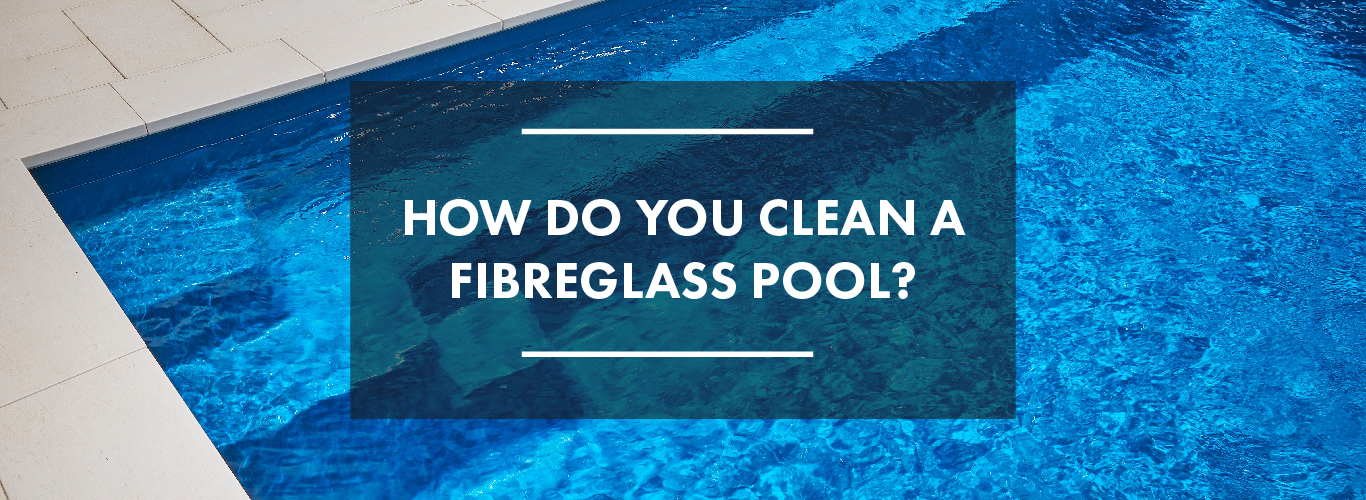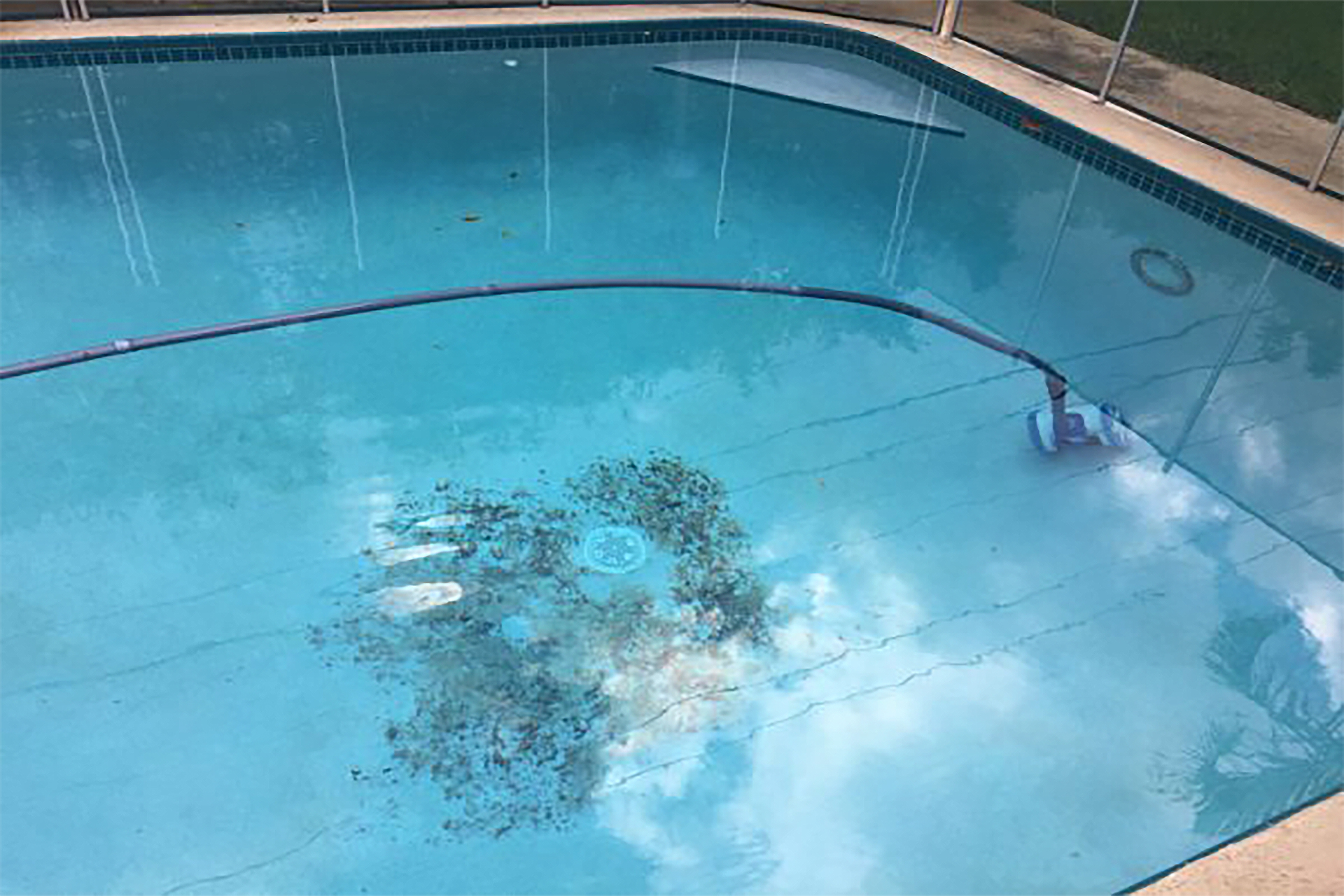How Do You Clean A Fibreglass Pool?
Purchasing a fibreglass swimming pool will most likely be the biggest investment you make for your home, that it is why it is important to ensure you know how to maintain and clean your pool the correct way. Generally speaking, fibreglass is easy to maintain, but there are a few things you need to understand so you can stay on track with your cleaning schedule, this will keep your fibreglass pool looking new for many years to come.

Always Clean Debris Weekly
Cleaning debris such as dirt, leaves and bugs from your pool regularly will ensure your fibreglass pool is kept clean and hygienic at all times. Even if your pool isn’t located near trees or leafy gardens, it is still important to stay on top of removing all debris otherwise your pool water could become dirty and unclean. To remove debris from your pool you will need to purchase a skimming net and a telescopic pole, this can be purchased from any pool shop and are generally not too expensive. Having a telescopic pole means you will be able to reach and clean anywhere around your pool.
Understanding Chemical Balance and Water Chemistry
It is highly important to understand that the water chemistry in your fibreglass pool must be balanced, this is important to keep your pool in fantastic condition. If the chemicals aren’t balanced correctly the water could become corrosive and you could end up with scale through your poo.l. If you keep your pool chemically balanced the correct way, you will prolong the lifespan of your fibreglass pool and the pool equipment. To ensure you keep your pool in top condition, there are 3 readings to keep a note of
1. p.H-p.H means the amount of acidity or alkalinity that is in your pool water. When your pool has a low p.H this is known as acidic and when this happens it will corrode both your pools surface and equipment. On the other end of measurements if your pool has a high p.H this means your water is alkaline and will lead to scale and calcium build-up. The measurements you should be aiming to achieve the correct balance is a p.H reading anywhere from 7.4-7.6.
2. Calcium- If your pool has too much calcium you will find the water will become cloudy and you will also start to see stains of corrosion on the surface of your pool. Calcium levels should be between 200 to 400 ppm, this is the ideal measurement to prevent staining
3. Alkalinity- Keeping the alkaline in the water at the correct measurements will help prevent scaling and corrosion in your pool. The water alkalinity should be between 60 – 200 parts per million (ppm).

What Causes Stains On A Fibreglass Pool?
There are several reasons as to why you might find stains in your swimming pool. A lot of the time stains will be caused by too much metal in the water, however, there are other reasons why your pool might stain. You will find the most common one you will come across will be white and chalky, these are caused by calcium which in turn means the chemicals in your water are not balanced correctly. if you find your pool is getting yellowish-brown stains, this is caused by the salt in your water. if you come across black spots on the surface, this is due to an excess of cobalt oxide. It is important to get the chemicals balanced correctly as an excess of cobalt oxide can cause damage to the gel coat over time. If you find you cannot remove the stains or that you are having trouble keeping them under control then we highly recommend contacting your local pool shop who will be able to assist you and provide some expert advice.
Pool Filters
Fibreglass pools need high-quality filters to keep them clean and hygienic. Each day you should be turning on your filter to let it run for a minimum of 6-8 hours. We have found that the best time to turn on your filters is after you have finished your time in the pool, this way all the dirt, leaves and dr\erbis from the day gets cleaned. Turning on your filters daily will also help to keep your chemicals balanced in the pool.
A Pool Cover Is A Fantastic Investment
Whether you use your pool a lot or a little it will still need to be maintained. It is important to prevent the water from getting dirty and contaminated, the easiest way to do this is by using a pool cover, this will also save you so much time with cleaning when you go to use your pool again. Fibreglass pools are easier to maintain compared to concrete and vinyl linear pools but it is still important to stay on track of a cleaning schedule and check the chemical balance regularly, in turn, you will spend less time cleaning and more time enjoying your pool!
Some Helpful Tips To Help You Maintain And Clean Your Pool
• As soon as you see a stain clean it, the longer it sits there and becomes darker in colour, the harder it is to be removed
• Run the filters for at least 6-8 hours each day
• Regularly check the PH Levels
• For small rust stains use a vitamin c tablet and rub with a soft bristle brush
• Use a pool cover when not in use
• Use a pool Vaccum regularly to remove dirt from the bottom
• Use your skimming net and telescopic pole to remove dirt and debris regularly
• If your pool continues to stain or you cant remove stubborn stains contact your local pool shop, they will give you expert advice
If you are lucky enough to own a fibreglass swimming pool then you must stay on top of a cleaning and maintenance schedule. Taking care of your fibreglass pool will keep it looking sparkling new for many years to come and will also prolong the lifespan of your pool. Factory Pools Perth have been transforming homeowners backyards for the past 30 years, we have an extensive amount of knowledge when it comes to looking after and maintaining your fibreglass pool. If you own a pool or maybe you are looking to purchase one, whichever the reason, feel free to contact us today and we can answer any questions you and can assist in any enquiries regarding a fibreglass pool!

